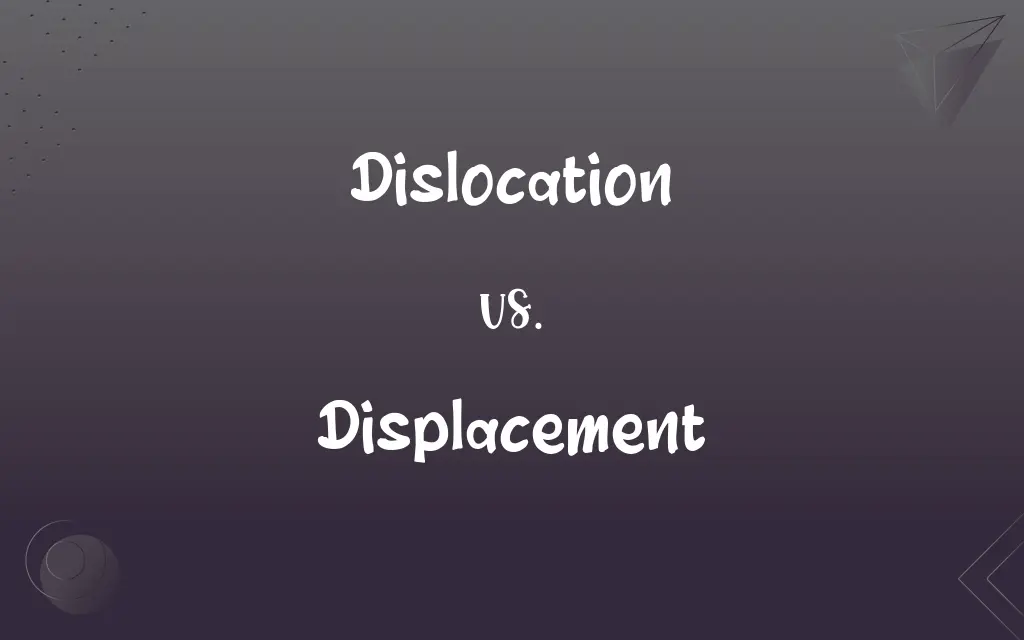Dislocation vs. Displacement: What's the Difference?
Edited by Aimie Carlson || By Janet White || Updated on September 28, 2023
Dislocation refers to the displacement of a bone from its joint, while Displacement denotes the movement of an object from its place or position.

Key Differences
Dislocation and Displacement, though often used interchangeably in colloquial language, have distinct meanings. Dislocation primarily refers to the disturbance or misalignment of parts, especially the moving of bones out of their normal position.
Displacement, on the other hand, broadly describes the act of moving something from its place or position. This term is versatile and can be applied to a variety of contexts, from physics to social sciences.
When someone says there's a dislocation in their shoulder, they're indicating that the bone has been moved from its original position in the joint. This condition can be painful and requires medical attention.
In contrast, talking about the displacement of a fluid in physics or the displacement of people due to a natural disaster emphasizes the shift or relocation from an original spot. The word has a more generalized application compared to dislocation.
Comparison Chart
Definition
Movement of a bone from its joint
Movement of an object from its place or position
ADVERTISEMENT
Usage
Medical terminology
Broadly used in various disciplines
Part of Speech
Noun
Noun
Contextual Application
Often pertains to body parts
Can pertain to objects, people, concepts
Synonyms
Misalignment, luxation
Shift, relocation, movement
Dislocation and Displacement Definitions
Dislocation
An interruption of continuity; a separation.
The earthquake caused a dislocation in the terrain.
ADVERTISEMENT
Displacement
The action of moving something from its place or position.
The displacement of the book made it hard to find.
Dislocation
Disruption or break in the orderly flow.
The roadblock caused a dislocation in the traffic.
Displacement
A defense mechanism where emotions are transferred from one object or person to another.
His anger displacement often caused misunderstandings.
Dislocation
Movement of a bone out of its normal joint position.
The fall caused a dislocation in his elbow.
Displacement
A shift in position measured from a reference point.
The displacement of the pendulum was five centimeters.
Dislocation
A phenomenon in crystal structures.
Dislocations in the crystal affect its strength.
Displacement
The removal of someone by a usurper.
The displacement of the leader led to political unrest.
Dislocation
The act or process of dislocating or the state of having been dislocated
"the severe emotional dislocation experienced by millions of immigrants ... who were forced to separate themselves forever from the ... circle of people and places on which they had depended" (Doris Kearns Goodwin).
Displacement
The act of displacing.
Dislocation
Displacement of a body part, especially the temporary displacement of a bone from its normal position.
Displacement
The condition of having been displaced.
Dislocation
(Chemistry) An imperfection in the crystal structure of a metal or other solid resulting from an absence of an atom or atoms in one or more layers of a crystal.
Displacement
(Chemistry) A reaction in which an atom, radical, ion, or molecule replaces another in a compound.
Dislocation
(Geology) See displacement.
Displacement
A vector or the magnitude of a vector from the initial position to a subsequent position assumed by a body.
Dislocation
The act of displacing, or the state of being displaced.
Displacement
The weight or volume of a fluid displaced by a floating body, used especially as a measurement of the weight or bulk of ships.
Dislocation
(geology) The displacement of parts of rocks or portions of strata from the situation which they originally occupied.
Displacement
The volume displaced by a single stroke of a piston in an engine or pump.
Dislocation
The act of dislocating, or putting out of joint; also, the condition of being thus displaced.
Displacement
The relative movement between the two sides of a fault.
Dislocation
(materials science) A linear defect in a crystal lattice. Because dislocations can shift within the crystal lattice, they tend to weaken the material, compared to a perfect crystal.
Displacement
The distance between the two sides of a fault. Also called dislocation.
Dislocation
(grammar) A sentence structure in which a constituent that could otherwise be either an argument or an adjunct of a clause occurs outside of and adjacent to the clause boundaries.
Displacement
(Psychiatry) A psychological defense mechanism in which there is an unconscious shift of emotions, affect, or desires from the original object to a more acceptable or immediate substitute.
Dislocation
The act of displacing, or the state of being displaced.
Displacement
The act of displacing, or the state of being displaced; a putting out of place.
Dislocation
The displacement of parts of rocks or portions of strata from the situation which they originally occupied. Slips, faults, and the like, are dislocations.
Displacement
The quantity of a liquid displaced by a floating body, as water by a ship, the weight of the displaced liquid being equal to that of the displacing body.
Dislocation
The act of dislocating, or putting out of joint; also, the condition of being thus displaced.
Displacement
(chemistry) The process of extracting soluble substances from organic material and the like, whereby a quantity of saturated solvent is displaced, or removed, for another quantity of the solvent.
Dislocation
An event that results in a displacement or discontinuity
Displacement
(fencing) Moving the target to avoid an attack; dodging.
Dislocation
The act of disrupting an established order so it fails to continue;
The social dislocations resulting from government policies
His warning came after the breakdown of talks in London
Displacement
(physics) A vector quantity which denotes distance with a directional component.
Dislocation
A displacement of a part (especially a bone) from its normal position (as in the shoulder or the vertebral column)
Displacement
(grammar) The capability of a communication system to refer to things that are not present (that existed or will exist at another time, or that exist at another location).
Dislocation
A disturbance from a proper, original, or usual place or state.
The new policy caused a dislocation in the industry.
Displacement
The act of displacing, or the state of being displaced; a putting out of place.
Unnecessary displacement of funds.
The displacement of the sun by parallax.
Displacement
The quantity of anything, as water, displaced by a floating body, as by a ship, the weight of the displaced liquid being equal to that of the displacing body.
Displacement
The process of extracting soluble substances from organic material and the like, whereby a quantity of saturated solvent is displaced, or removed, for another quantity of the solvent.
Displacement
An event in which something is displaced without rotation
Displacement
Act of taking the place of another especially using underhanded tactics
Displacement
The act of uniform movement
Displacement
(chemistry) a reaction in which an elementary substance displaces and sets free a constituent element from a compound
Displacement
(psychiatry) a defense mechanism that transfers affect or reaction from the original object to some more acceptable one
Displacement
To move something from its natural environment
Displacement
Act of removing from office or employment
Displacement
The volume or quantity of fluid moved by a particular force or agent.
The water pump had a displacement of three liters.
FAQs
Is Dislocation always medical?
Predominantly, but it can also mean disruption in non-medical contexts.
Can Displacement refer to people?
Yes, for instance, people can be displaced due to war or natural disasters.
Are Dislocation and Displacement synonyms?
No, while they can both indicate movement from a position, their primary contexts differ.
What's the opposite of Dislocation?
Relocation or realignment.
Can Dislocation occur in machines?
Yes, mechanical parts can experience dislocation affecting their function.
What causes a Dislocation?
Traumatic injuries, certain movements, or genetic factors.
How do you fix a Dislocation?
Often through a process called reduction, done by a medical professional.
Is Displacement used in physics?
Yes, particularly in fluid dynamics and mechanics.
Is Displacement always physical?
No, it can also refer to emotional or psychological shifts.
Can Dislocation heal by itself?
Some minor dislocations might self-resolve, but medical intervention is often required.
What's the unit of Displacement in physics?
Meters (or feet in the imperial system).
Can Displacement have a direction?
Yes, in physics, it's a vector quantity with both magnitude and direction.
Does Displacement always indicate a negative change?
No, it's neutral and simply denotes movement from one position to another.
How does Displacement relate to distance?
Displacement is the shortest distance from the starting point to the endpoint, not necessarily the path traveled.
Are there different types of Dislocations?
Yes, based on which joint or bone is affected.
About Author
Written by
Janet WhiteJanet White has been an esteemed writer and blogger for Difference Wiki. Holding a Master's degree in Science and Medical Journalism from the prestigious Boston University, she has consistently demonstrated her expertise and passion for her field. When she's not immersed in her work, Janet relishes her time exercising, delving into a good book, and cherishing moments with friends and family.
Edited by
Aimie CarlsonAimie Carlson, holding a master's degree in English literature, is a fervent English language enthusiast. She lends her writing talents to Difference Wiki, a prominent website that specializes in comparisons, offering readers insightful analyses that both captivate and inform.































































